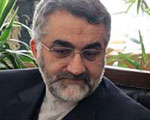 Reuters: A senior Iranian lawmaker warned Western powers they would soon have to accept the reality of the country’s nuclear advances, Iran’s state news agency reported late on Saturday, days before talks are set to re-open on its disputed nuclear programme.
Reuters: A senior Iranian lawmaker warned Western powers they would soon have to accept the reality of the country’s nuclear advances, Iran’s state news agency reported late on Saturday, days before talks are set to re-open on its disputed nuclear programme.
By Marcus George
 DUBAI (Reuters) – A senior Iranian lawmaker warned Western powers they would soon have to accept the reality of the country’s nuclear advances, Iran’s state news agency reported late on Saturday, days before talks are set to re-open on its disputed nuclear programme.
DUBAI (Reuters) – A senior Iranian lawmaker warned Western powers they would soon have to accept the reality of the country’s nuclear advances, Iran’s state news agency reported late on Saturday, days before talks are set to re-open on its disputed nuclear programme.
The head of the parliamentary committee for national security and foreign policy, Alaeddin Boroujerdi, was speaking at a ceremony in Mashhad in memory of what Iran describes as its nuclear martyrs; at least four scientists associated with Iran’s nuclear programme have been assassinated since 2010 and a fifth was wounded in a bomb attack.
Western countries suspect Tehran of covertly developing a nuclear weapons programme, accusations Iran has repeatedly denied. Both sides are set to take part in negotiations this week in an effort to find a solution to international concerns, though even the location of the talks has not yet been agreed.
Boroujerdi said the P5+1 group of countries needed to change their policy because “confronting the Islamic Republic will not be to their benefit”, the IRNA news agency quoted him as saying.
“Honorable Iran will continue the debate about peaceful nuclear energy, and that moment isn’t far away when the world will see that arrogant countries, led by America and Europe, will accept the reality of nuclear advances and Iran’s membership into the nuclear club.”
He added that despite the climate of threats and sanctions, Iran had made great progress in its nuclear capability and was proficient in all stages of enrichment from mining raw uranium in Iranian mines, producing yellow cake (concentrated uranium powder), building centrifuges and injecting uranium gas into them.
In February Iran announced it had loaded domestically made fuel rods into the Tehran Research Reactor, which produces radio isotopes for medical use and agriculture.
Iran has repeatedly pointed out that under its membership of the Nuclear Non-Proliferation Treaty, it has the right to engage in peaceful nuclear activities.
Boroujerdi emphasized that Iran’s nuclear programme was solely for peaceful needs, but that if the International Atomic Energy Agency did not keep to its commitments, “then no doubt our enthusiastic young scientists will build a reactor inside the country”.
Speaking in the presence of families of scientists who were killed, Boroujerdi warned that assassinating Iranian nuclear scientists was pointless.
“Iran’s advances have forced the Zionist regime (Israel), the Arabs and America to turn to eliminating our nuclear scientists. But they should understand that such evil deeds will lead nowhere, because thousands of university students and professors in Iran will continue along the road of nuclear science.”
A recent report by the IAEA said Iran had tripled its production of higher grade enriched uranium, which has caused further concern that there is a military motive to its activities.
While some analysts remain doubtful about Iran’s claims, experts say that uranium enriched to 20 percent represents most of the technical effort needed to attain the 90 percent threshold required for nuclear explosions.
The Islamic Republic says the more highly refined uranium will replenish dwindling stocks of special fuel for a Tehran reactor that produces much-needed medical isotopes for thousands of cancer patients across the country.
The United States and its allies have imposed new sanctions against Iran’s financial and energy sectors to force Tehran to abandon its enrichment activities.
Israel has threatened Iran with pre-emptive strikes to stop it getting the bomb, but U.S. president Barack Obama has emphasized the importance of trying to find a diplomatic solution.
The next round of talks between Iran and the P5+1 group of countries comprising the permanent members of the UN Security Council and Germany had been due to take place this Friday, April 13, but the two sides have been seemingly unable to agree on a location.
(Reporting By Marcus George; Editing by Will Waterman)


